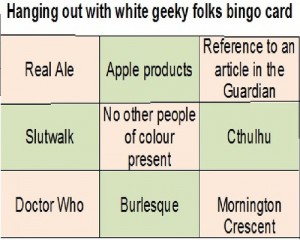
I came across the “Hanging out with white geeky folks bingo card” on Jacqueline Applebee’s tumblr the other day when someone put her up as a bi role model in the #AwesomelyBi discussion. I loved it.
I am a white geeky person. In my short reign over on @TwkLGBTQ this week, I have referenced multiple Guardian articles, we’ve discussed Doctor Who extensively, and I’ve made a Mornington Crescent joke. There’s at least one Cthulhu plushie in my house, I have a number of friends who do the real ale thing, and I will happily hold forth on Apple vs Linux for hours. And while I am friends with quite a few people of colour, I can count on one hand the social situations I’ve been in where white people like me have been in the minority. This bingo card is basically my life, and to me that is completely normal.
What I love about it is how it allows me to see myself and the community I’m part of from a completely new angle. It makes me very aware that there are people out there with very different experiences from very different backgrounds to whom this white geeky shared headspace looks ever so slightly strange. There are people with whom I share part of my identity, who have some similar experiences to me, who nonetheless have other identities and different needs to me, even in the areas where we overlap. And that’s a damn good thing to be reminded of.
We’ve spent a lot of this week on @TwkLGBTQ talking about the experiences bisexual people share: invisibility, erasure, biphobia. What we haven’t quite paid enough attention to is how our experiences differ based on the multiple identities we call our own. How does race or class or disability, gender identity, religion or immigration status affect the way we experience our sexuality and the way others perceive or treat us?
Personally, I find being a bisexual immigrant allows me to make bad jokes about stealing your jobs and your women. Less flippantly, I find those identities collide most not here in the UK but back in Bulgaria where there’s no way I could start challenging biphobia because of the amount of homophobia I have wade through first.
To me, intersectionality matters hugely. We don’t live in a single pigeon hole, and it’s vital to remember that not all our experiences are the same. Different parts of our community have different needs, and the best way to be mindful of that is to learn about them. So I’d love to hear more about other people’s intersectional experiences with bisexuality.
ETA
@applewriter kindly joined the discussion this evening to share some of the assumptions she faces from the white QUILTBAG community. Here’s what she said:
I made the bingo card as a way to not get sad by feeling like a constant outsider. The bi communities are not diverse at all… I find the casual racism, and the persistent assumptions many bi & trans people make depressing. A few: that we have English as a 1st language & are all good w academic-speak, that we have time & money to spare. Another big one: that communities of colour are automatically bi & trans phobic. That whites are our saviours. And lastly that bi & trans people of colour are happy to spend their time explaining racism to white queers. I’m happy to explain a bit now, but its often used as a derailing tactic by racist folks. Plus I’m not that busy.
Previous: You’re bi? Threesomes!
Next: Domestic abuse in the LGBT community
@TWkLGBTQ Index